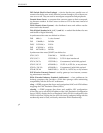
g-3
GLOSSARY
ATM Peer-to-Peer Connection - a virtual channel connection (VCC) or a vir-
tual path connection (VPC) directly established, such as workstation-to-work-
station. This setup is not commonly used in networks.
ATM Traffic Descriptor - a generic list of parameters that can be used to cap-
ture the intrinsic traffic characteristics of a requested ATM connection.
ATM User-to-User Connection - an association established by the ATM Layer
to support communication between two or more ATM service users (i.e.,
between two or more next higher layer entities or between two or more ATM
entities). The communication over an ATM Layer connection may be either
bidirectional or unidirectional. The same Virtual Channel Identifier (VCI) is
used for both directions of a connection at an interface.
atmarp - a FORE program that shows and manipulates ATM ARP entries
maintained by the given device driver. This is also used to establish PVC con-
nections.
atmconfig - a FORE program used to enable or disable SPANS signalling.
atmstat - a FORE program that shows statistics gathered about a given
adapter card by the device driver. These statistics include ATM layer and
ATM adaptation layer cell and error counts. This can also be used to query
other hosts via SNMP.
Backbone - the main connectivity device of a distributed system. All systems
that have connectivity to the backbone connect to each other. This does not
stop systems from setting up private arrangements with each other to bypass
the backbone for cost, performance, or security.
Bandwidth - usually identifies the capacity or amount of data that can be sent
through a given circuit; may be user-specified in a PVC.
BGP (Border Gateway) Protocol - used by gateways in an internet, connect-
ing autonomous networks. It is derived from experiences learned using the
EGP.
BIP (Bit Interleaved Parity) - an error-detection technique in which character
bit patterns are forced into parity, so that the total number of one bits is
always odd or always even. This is accomplished by the addition of a one or
zero bit to each byte, as the byte is transmitted; at the other end of the trans-
mission, the receiving device verifies the parity (odd or even) and the accu-
racy of the transmission.
B-ISDN (Broadband Integrated Services Digital Network) - a common digi-
tal network suitable for voice, video, and high-speed data services running at
rates beginning at 155 Mbps.
Bridge - a device that expands a Local Area Network by forwarding frames
between data link layers associated with two separate cables, usually carrying


















